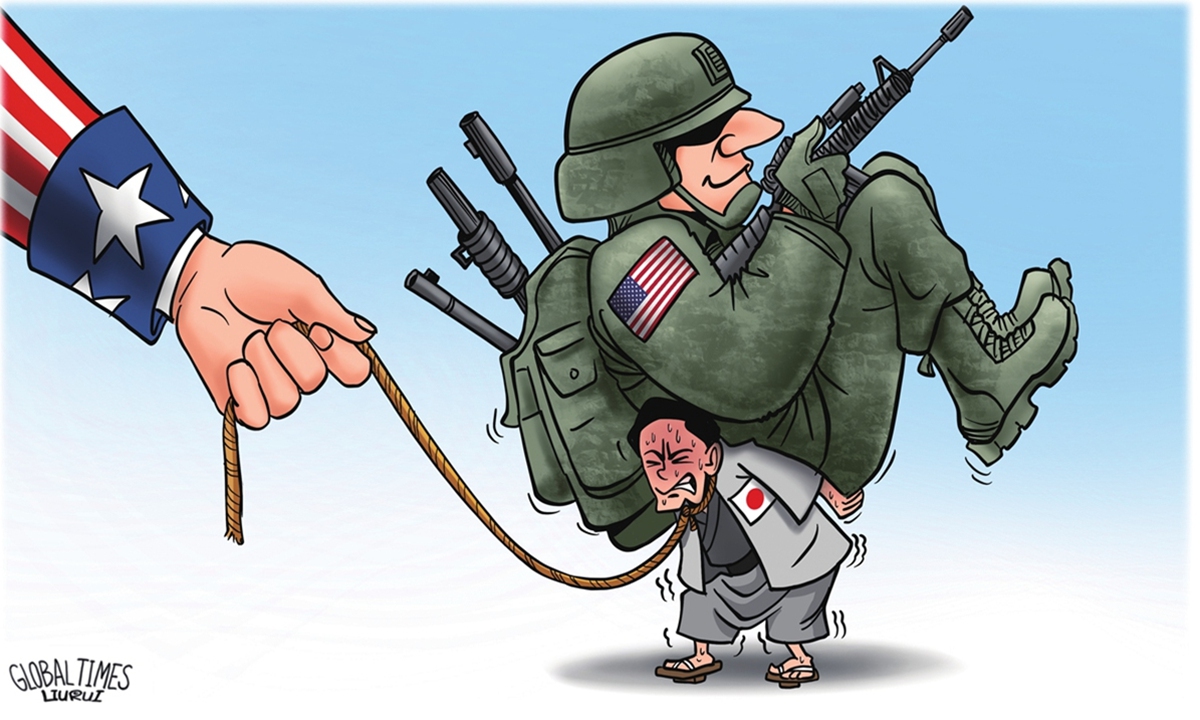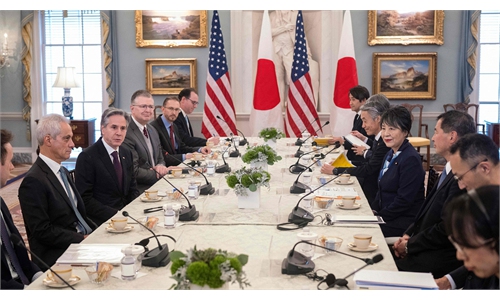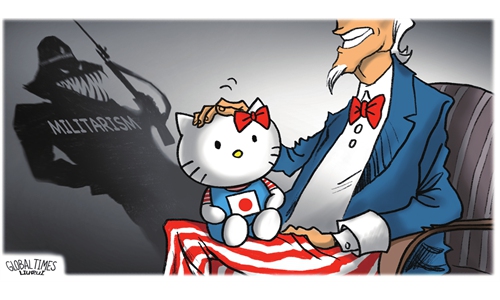US-Japan alliance upgrade undermines regional peace, exposes asymmetry in relations

Illustration: Liu Rui/GT
The Financial Times reported on Sunday that the US and Japan, with an eye on China, are planning the biggest upgrade to their security alliance in 60 years. According to the report, the plan, which will see the restructuring of the US military command in Japan, will be announced during Japanese Prime Minister Fumio Kishida's visit to the US in April. Responding to the report, Tokyo's top government spokesperson said on Monday that the two are "discussing ways to strengthen cooperation in command and control in order to enhance interoperability and readiness."The rise of China in the past few years has unsettled the US, as it feels that its global hegemony is challenged, and Japan wants to resume its primacy in East Asia. At the end of 2022, Japan passed three key defense policy documents which called China the "greatest strategic challenge." The three documents were also seen as a major shift from Japan's defensive policy since the end of World War II.
The US and Japan have been working to strengthen their alliance. In January 2023, US and Japanese officials said the two nations would expand their military and security cooperation by improving Japan's missile strike capabilities and making the US Marine unit in the country more flexible for potential combat.
Wang Guangtao, an associate research fellow with the Center for Japanese Studies at Fudan University, told the Global Times that the latest upgrade of the US-Japan alliance will see a boost of the power of the US command in Japan, which marks a major change of the two militaries at the operational level and helps the US military to more closely coordinate with Japan to deal with emergencies.
The Financial Times cited Philip Davidson, who retired as the US' Indo-Pacific commander in 2021, as saying that the defense strategies of the US and Japan have converged. Chinese experts noted that this is because their perceived threat is the same, therefore the enhanced military cooperation between the two, Japan's record defense budgets and its purchase of offensive weapons from the US all fit into the US' China containment strategy and Japan's goal of strengthening its presence in East Asia and the so-called Indo-Pacific region. They are also in a tacit agreement to bring in more partners to more effectively contain and deter China. The upcoming April summit between US President Joe Biden and Kishida will also see the participation of the Philippine president, as they want to exploit the tensions between China and the Southeast Asian country that have recently flared up due to the South China Sea disputes.
Nonetheless, the US-Japan alliance is not all roses. Wang noted that it is worth analyzing what Japan will gain and lose from the upgrading of its alliance with the US.
"It seems that Japan does not obtain a reliable security commitment from the US. Japan will have to give up a fair amount of autonomy and commanding rights in the military and security fields. Whether Japan's strategic initiative is stronger or weaker will be obvious. Meanwhile, the expanded scope of activity of the US military in Japan may have a negative impact on local communities," Wang said.
Cai Liang, director and senior research fellow at the Center for Northeast Asian Studies under the Institute for Foreign Policy Studies, the Shanghai Institute for International Studies, pointed to the dilemma faced by traditional alliances.
"The US-Japan alliance is an asymmetric relationship, with the US being 'big brother' and Japan in a subordinate position. With US power declining, it puts hopes on allies and pushes them like agents to the forefront to confront China, so that it can keep itself away once a conflict occurs. But Japan is not willing to be a whipping boy. It would drag the US into the same conflict it is involved in. This is a structural contradiction in this alliance," said Cai.
The paradox is, Cai added, the US and Japan strengthen their security alliance to deter China and plan for a potential crisis in Taiwan island as they say, but if a crisis truly occurs, the essence of the alliance will be fully exposed.
Experts say that the US-Japan alliance is evolving into an axis of evil that will pose more direct uncertainty and instability to the region and even bring destruction to peace in Asia.


